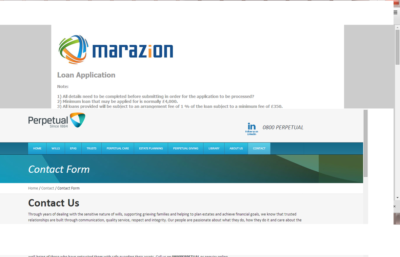
RESPONSE TO GOVERNMENT CONSULTATION ON PENSION SCAMS AND COLD CALLING BY ANGIE BROOKS OF PENSION LIFE 13.2.2017
The Government consultation has been copied below,with my comments and answers in bold.
—————————— —————————— ——————————
Because of the size of individual pension pots, and because people do not have to engage with their savings until much later in life, pension savings are an attractive target for fraudsters. Pension scams can cost people their life savings, and leave people facing retirement with limited income, and little or no opportunity to build their pension savings back up.
Yes – and the government, HMRC, the Pensions Regulator and the FCA have known this for more than fifteen years but have done little to attempt to combat this scourge effectively.
The government takes the threat of pension scams very seriously. Rubbish. The government has done nothing to help combat the problem and indeed George Osborne’s Pensions “Freedoms” made the problem worse.
The government is committed to protecting people by helping them to avoid putting their money into scams (including through risk warnings, high profile media campaigns, and free and impartial guidance from Pension Wise and the Pensions Advisory Service; and by pursuing fraudsters wherever possible. A statement that the government is “committed” is very different to evidence that the government has actually been committed and has done something effective. Evidence shows that the government has done absolutely nothing. Furthermore, the government has refused to engage for more than three years and has referred to the victims of pension scams as “fools”. Indeed, it has recently come to my attention that even the Pensions Regulator has claimed that “pensioners had “taken advantage” of the pensions system by accessing money which is not their money.”
1.1 Evidence of problem
The models used by pension fraudsters often span departmental and agency boundaries and can be complex and multifaceted. In order to tackle pension scams, the government established Project Bloom, a cross-government taskforce led by the Pensions Regulator (TPR) and comprising of government, regulators and law enforcement agencies; to monitor trends, share intelligence on emerging threats, and help co-ordinate action to tackle pension scams. Project Bloom should be re-named Project Wilt. It achieved nothing. The scammers are still out there, scamming away quite happily. There is no evidence that Project Bloom ever did anything effective to stop or prevent scams and scammers.
Project Bloom has been acting to raise awareness of pension scams, in particular through TPR’s “Scorpion”, Scorpion achieved very little and the Financial Conduct Authority’s “Scam smart” campaigns. Scam Smart achieved nothing. However, it has become increasingly clear that more direct intervention is necessary to curb the threat of pension scams in the UK:
- research by the Money Advice Service 1 suggests that there could be as many as 8 scam calls every second – the equivalent of 250 million calls per year. Citizens Advice have calculated that 10.9 million consumers have received unsolicited contact about their pension since April 2015 2 This doesn’t make sense. Have there been 250 million or 10.9 million scam calls. Get the facts and figures right please.
- there were 30,000 ‘Defined Contribution’ scheme transfers in 2015/16, representing £1 billion of assets. Industry estimates suggest that fraudsters could be behind as many as one in 10 pension transfer requests 3 And the State has done nothing about it. This is a disgrace.
- individuals reported nearly £19 million in suspected pension liberation fraud between April 2015 and March 2016 – twice as much as for the same period in 2014-15 Obviously. Pensions “Freedoms” helped the scammers enormously. Did nobody ever think to question George Osborne’s pension “wisdom”?
Pension investments are long-term, so many individuals may not recognise that they have been the victim of a pension scam until they seek to access their savings. There are also concerns that some suspected scams are under-reported to the police, or other law enforcement agencies. Victims of pension scams do report many cases to the police and other law enforcement agencies, but the police do absolutely nothing as it is “too difficult”.
People may also be dissuaded from reporting pension scams, because they don’t want to acknowledge that an investment may be a scam, because they are embarrassed, or because they are worried about facing a tax charge for unauthorised pension access. And rightly so. HMRC pursues the victims rather than the perpetrators.
The government is working with HMRC, no it isn’t – the government has refused to engage despite many urgent requests
Action Fraud which doesn’t exist and takes no action and the National Fraud Intelligence Bureau which isn’t interested through Project Bloom which achieves nothing, to encourage and enable the consistent reporting of pension scams data from firms, individuals, law enforcement agencies and regulators. Ask the victims what they think about making reports: even a serving police officer has been begging the police for several years to take action over the loss of his police pension at the hands of a well-known serial scammer and they won’t (or can’t be bothered to) take any action.
2.1 Definition of a pension scam
The government previously considered pension scams to be broadly “attempts to release funds from HMRC registered pension schemes in an unauthorised way”. However, in light of the pension freedoms, the government believes that fraudsters’ focus may shift to a wider category of activities, through which to perpetuate scams involving pension savings. Project Bloom has therefore developed a definition that focuses on a wider set of activity that it believes should be considered as pension scams, namely:
“The marketing of products and arrangements and successful or unsuccessful attempts by a party (the “scammer”) to:
- release funds from an HMRC registered pension scheme, often resulting in a tax charge that is normally not anticipated by the member
- persuade individuals over the age of 55 to flexibly access their pension savings in order to invest in inappropriate investments
- persuade individuals under 55 to transfer their pension savings in order to invest in inappropriate investments
where the scammer has misled the individual in relation to the nature of, or risks attached to, the purported investment(s), or their appropriateness for that individual investor.”
The techniques used to perpetuate pension scams include:
- high pressure sales tactics, including cold calling
- attempts to discredit the individual’s existing arrangement
- ignoring or claiming to have dealt with the tax consequences
- promises of ‘guaranteed’ high returns
- descriptions that do not properly portray the risks of the investments
- overseas investments that lack local regulation or compensation if things go wrong
Question 2.1
Does the definition in 2.1 above capture the key areas of consumer detriment caused by pension scam activity?
Answer 2.1
This answer is “not too badly” and shows that the parties who comprise Project Bloom have done at least some homework – but it does leave out some key issues. The players and “controlling minds” in the scams fall broadly into two categories: introducers and advisers.
The ordinary man in the street does not understand that an introducer is not a professionally-qualified or regulated individual or firm – but a sales agent who has half learned some of the jargon and who has an impressive leather-bound folder with glossy brochures and forms.
The adviser – or the individual or firm which purports to be an adviser – often works in the background to sign off “advice” but is rarely (if ever) properly regulated to provide advice.
Sometimes the introducer and adviser are separate entities, and sometimes they are actually the same but appear to be separate. They usually have agreed terms with high-risk funds which pay handsome investment introduction commissions and sometimes they even have their own funds.
There are many lies told about the real nature of the transfer – and, of course, these lies are only discovered after it is too late. Ordinary people don’t understand what questions they ought to be asking and even if they did, they probably wouldn’t understand the answers.
Question 2.2
Are there any other factors that should be considered as signs of a scam?
Answer 2.2
Very often, the individuals involved in the scam have previous history. If the intended victim knew where to look or who to ask/consult then he or she might find out that the charming, plausible and credible person posing as a respectable pension adviser is actually a serial scammer.
Scammers never seem to turn over a new leaf, but just devise new and more innovative ways of scamming. However, if a scamming dictionary were to be produced, there are some key phrases which the scammers use habitually:
· Your pension is frozen
· A QROPS will be more tax efficient
· You can have greater investment flexibility and gain higher returns
· Our firm is fully regulated
· I am fully qualified
· We are going to put your pension into an award-winning fund
· HMRC approved
· tPR approved
· Approved
3. Banning cold calling in relation to pensions
3.1 The issue
Cold calling is the most common method used to initiate pension fraud. In 2013, 97% of cases brought to Citizen’s Advice involving pensions liberation scams stemmed from cold calling 5. Age UK found that 53% of people age 65+ believe they have been contacted by fraudsters. Additionally, the 87% of unsolicited contact reported to the Financial Conduct Authority was via telephone 6. As discussed in Chapter 1, the scale of the problem is not reflected in current statistics due to under reporting.
Fraudsters often call individuals posing as legitimate businesses and can be very convincing, even offering false FCA registration numbers (which itself amounts to a criminal offence) and professional looking marketing materials. Additionally, consumers are highly likely to miss the signs of a scam; a Citizens Advice poll found that 9 in 10 people would miss the common warning signs of a scam such as unrealistically high or guaranteed investment returns, or offers of a free pension review. These factors combined mean that engaging in conversation with a cold caller about pensions can pose a significant risk to consumers.
The government has chosen to consult on a ban on cold calling in relation to pensions as a priority as, for many people, their pension is their single biggest asset (aside from their property), on which they will depend throughout their retirement. Pension scams can have devastating consequences such as the loss of an entire pension fund, and the chances of recovering these losses are very low, leaving victims without the means to fund their retirement. Banning cold calling in relation to pensions will cut off scams at the source, encouraging consumers to put the phone down immediately.
Question 3.1
In your experience, how are consumers affected by cold calling about pensions? Do any consumers benefit from cold calling about pensions?
Answer 3.1
People who know about the dangers of cold calls are usually those who have already been scammed or know of someone who has been scammed. Therefore, they know how to deal with the cold call. But the vast majority of the rest of the cold-call recipients, don’t know about the dangers of pension scammers because there has been no effective public warning and information campaign. Few people are aware of the Pensions Regulator’s Scorpion campaign – or have even heard of the Pensions Regulator.
3.2 The current rules on cold calling
Currently, the Financial Conduct Authority (FCA), the Information Commissioner’s Office (ICO) and Ofcom have powers to regulate cold calls to an extent, but they do not have the powers to introduce a full ban.
The FCA does ban some types of cold calls, and applies restrictions to others. The restrictions only apply to FCA authorised firms, so many cold calls will be outside of the scope of these rules. In relation to pension reviews, calls can be made if the recipient is an existing client who expects to receive such calls, or a prospective client in certain circumstances, for example if they have opted into calls.
The ICO is responsible for the regulation of the Privacy and Electronic Communications Regulations (PECR) 2003, and regulates unsolicited direct marketing calls which originate from the UK or are made from abroad on behalf of UK companies. The ICO can take enforcement action against organisations that, without consent, make automated and direct marketing calls to numbers registered with the Telephone Preference Service. Consent must be clear and informed. Consent can also be given to allow contact by third parties.
Ofcom also has powers under sections 128 to 130 of the Communications Act 2003 to enforce against “persistent misuse” of electronic communications networks or services. Ofcom can exercise its powers to investigate silent or abandoned calls (which may have been intended to be direct marketing calls). If during the course of its investigations, Ofcom finds that the caller’s conduct could amount to persistent misuse (for example, by making silent and abandoned calls in accordance with section 128 of the Communications Act 2003), Ofcom have the power to issue a Civil Monetary Penalty of up to £2 million under the persistent misuse provisions.
The government has taken a number of recent actions to tackle nuisance calls more widely, including
- introducing a measure in the Digital Economy Bill, making it a requirement for the Information Commissioner to issue a statutory code of practice on direct marketing
- amending the Privacy and Electronic Communications (EC Directive) Regulations (2003) (PECR) to require all direct marketing callers to provide Caller Line Identification
- lowering the legal threshold at which the ICO may impose a monetary penalty on organisations breaching PECR
- making it easier for the ICO to more effectively share information with Ofcom in relation to nuisance calls through an amendment to the Communications Act 2003
Answer 3.2
In other words, there is no current effective protection or sanction against cold callers. And despite the scammers having used this tool in their arsenal of scamming weapons for well over six years, the government has done nothing about it. The scammers know this and vast empires have evolved based on the widespread practice of harvesting databases and setting up cold-calling boiler rooms.
The same individuals and firms who were aggressively cold calling back in 2012 are still doing it very effectively today. Meanwhile, the government sits back and does nothing.
3.3 Banning cold calling in relation to pensions
The government proposes to ban all cold calls in relation to pensions. This will be achieved through primary legislation.
The proposed ban will send a clear message to consumers that no legitimate firm will ever cold call them regarding their pension, encouraging consumers to put the phone down on cold callers immediately. This will cut off the main mechanism used to persuade people that they are offering legitimate pension investments and services, and reduce the number of consumer requests to transfer to illegitimate schemes.
The government will also give the ICO the ability to use their existing enforcement powers to impose civil sanctions on firms located or operating in the United Kingdom who breach the ban, including the power to issue fines of up to £500,000.
Other agencies, including the police and the FCA already have wide ranging powers to tackle fraudulent activity. These agencies will continue to work to address the problem of pension scams.
Answer 3.3
This is, of course, very admirable and the sound of the slamming of the stable door will no doubt be welcomed by those who know about it – i.e. the victims for whom this ban is years too late.
The “clear message” must, however, be broadcast widely and loudly. It is no use passing a law if nobody knows about it – just as it was no use putting together the Scorpion Campaign when nobody had ever heard of the Pensions Regulator.
The fines are a great idea, but none will ever be collected since the scammers’ cold-calling operations will simply move offshore. But it will give the horse a good laugh.
To state that the police and the FCA “have wide ranging powers to tackle fraudulent activity” is, however, pure nonsense. The government should know better than to make a statement which is, effectively, a lie. The FCA have repeatedly failed to take action against UK-based scammers – despite many reports and even several visits to their offices in the past couple of years. Many police forces have received detailed reports of scams but there has only been one reported conviction and to my knowledge only one police officer is currently actively investigating a scammer. Even a serving police officer who lost his police pension to one of the well-known serial scammers has spent several years desperately trying to get the police to take action against the scammers. The police just can’t be bothered and they find pension scams just too difficult and complex to deal with. It is much easier to chase after burglars who pinch a few hundred pounds’ worth of household contents than the scammers who get away with hundreds of millions of pounds of victims’ pension funds.
3.4 The scope of the ban
The government is proposing a ban with a wide scope to prevent it being circumvented by firms adapting their business models to avoid the ban. It is seeking views on the scope of the ban.
Answer 3.4
What the government must do is something which not only seeks to prevent future scams, but also secure convictions for ALL the previous scammers to send out the clear message that there is a ZERO TOLERANCE policy to scammers.
As the cold calling outfits will move offshore to Gibraltar, the Isle of Man, Malta, Cyprus etc., the law must encompass all individuals and firms in the chain of which the cold calling operation is an integral part. Let me explain what I mean: a UK-based, FCA-registered firm called Gerard Associates cold called a victim last year. The victim’s pension was then transferred into a Maltese QROPS and invested in The Resort Group Cape Verde property. Along the way, the victim received “advice” from Strategic Wealth/Gibro Wealth which is a firm regulated by the FCA for insurance mediation only – certainly not pension or investment advice.
So the UK authorities have to work with the offshore authorities to bring all the people and firms in the chain to justice – including the pension trustees. Just taking action against the cold callers is like just replacing one tyre on a car with four bald tyres.
3.5 The scope of ‘in relation to pensions’
The proposed ban is intended to catch various types of pension scams, including ‘free pension reviews’ and misleading offers of high return pension funds. The government has outlined below the sorts of phone conversations that it intends to fall within the scope of the ban:
- offers of a ‘free pension review’, or other free financial advice or guidance
- assessments of the performance of the individual’s current pension funds
- inducements to hold certain investments within a pensions tax wrapper including overseas investments
- promotions of retirement income products such as drawdown and annuity products
- inducements to release pension funds early
- inducements to release funds from a pension and transfer them into a bank account
- inducement to transfer a pension fund
- introductions to a firm dealing in pensions investments
- offers to assess charges on the pension
The conversations that the government intends to be within the scope of the ban include both inducements to transfer funds directly from a pension scheme to a scam vehicle, and to move the funds into a bank account. They also include calls that result in ‘hand-offs’ to other organisations involved in fraudulent behaviour. The government believes that this will ensure that the majority of pension scam models are within scope.
The government does not have powers to take action against firms making calls from overseas, if the company is not registered in the UK. However, the strong message that a ban sends to consumers will prevent them from engaging with cold callers from overseas, protecting them indirectly.
Question 3.2
Do you agree that the scope of the ban should include the actions set out in paragraph 3.5 above? Are there any other activities that should fall within the scope of the proposed ban on pensions cold calling?
Answer 3.2
The government has completely missed the point. There is a much wider picture:
a. UK regulators have not only got to start doing some actual regulating, but they have got to work with regulators in all QROPS jurisdictions
b. FCA-registered advisers with insurance mediation licenses who provide pension and investment advice must be sanctioned
c. FCA-registered firms who have been caught being involved at any level with a chain that involves cold calling must not only be sanctioned but struck off and prevented from operating.
d. Individuals who have worked for or controlled firms mentioned in b and c above must be prevented from working in financial services at any level
e. Offshore firms and trustees involved in any scams – whether cold calling is involved or not – should be reported to their respective regulators
f. All those who have been involved in pension scams and/or cold calling must be prosecuted to send out a clear message that this is a crime which will not be tolerated
g. Individuals and firms promoting UCIS funds to UK retail investors must be prosecuted
h. The government and the police have got to understand that most – if not all – the currently operating scammers are the same people who have already scammed thousands of victims out of hundreds of millions of pounds. And they have got away with it. And they will continue to get away with it if the government and the police continue to do nothing.
i. HMRC are still registering scam schemes. They failed to de-register schemes back in 2010 when they realised they were being used for nefarious purposes and they continue today to fail to de-register them. As soon as a QROPS is found to be used for scamming purposes, it should be removed from the list and a serious question mark over the jurisdiction should be raised.
j. Ceding providers, who have got away with negligent and sloppy conduct for years, must be sanctioned for allowing transfers into obvious scam schemes. The Pensions Regulator warned these trustees they should be liable to compensate their members for any damage suffered as a result of such failings, but failed to ensure this was a legally-enforceable obligation.
3.6 Excluding legitimate interactions
The proposal is not intended to apply to legitimate interactions, including where consumers have expressly requested information from a firm, or where an existing client relationship exists.
In this context it is proposed that the meaning of a legitimate existing relationship would be similar to the concept of an ‘established existing client relationship’ as set out in FCA rules. FCA rules say that an established existing client relationship with a firm exists only where the consumer envisages receiving calls from them. If this approach was adopted, examples of callers who would not be in scope of the ban would be:
- an individual’s current pension provider
- pension providers holding funds from an individual’s previous employments
- a financial adviser the individual has previously had appointments with
If a consumer has not previously engaged directly with a firm, they reasonably would not expect to receive calls from them. Therefore, examples of callers who would not fall within the definition of an ‘existing client relationship’ and would be covered by the proposed ban would be:
- a firm who has been passed a consumer’s details by a third party
- a pension provider offering a deal on their products if the individual switches provider
- a pensions adviser who has acquired the individual’s details from a public directory
The government does not intend to change existing provisions which make it illegal to imitate an individual’s pension provider or an authorised firm.
The proposed ban is also intended to prevent consumers who inadvertently ‘opt-in’ to receiving third party communications being targeted. While responses to express requests for a call from the consumer are not within scope of the proposal, the government will make it clear that failing to opt out of calls from third parties, or agreeing to standard terms that include provision for calls without separately expressing willingness to receive them, does not constitute an express request.
Examples of calls that would be in response to an ‘express request’ could be:
- a provider returning a call to a consumer who has left a voicemail, asking for further information on their products, after seeing an advert in the paper
- a financial adviser calling a prospective client who has sent them an email enquiry through an adviser database
Examples of calls that would not be in a response to an ‘express request’ could be:
- calling a customer of an online shopping website who has opted to receive third party marketing calls
- a call that follows a marketing letter in the post, which says that the individual will receive a call about their pension if they don’t opt out via text
- a call to a consumer who has just purchased a financial product, where the terms and conditions for that product contained a clause stating that the firm can pass their details to other providers of financial products
Question 3.3
Do you agree that existing client relationships and express requests should be excluded from the proposed ban?
Answer 3.3
I think the above potentially opens the door to further abuse. How would one prove that a person did or did not chose the opt out option? It would be the victim’s word against the scammer’s. The government has to remember that independent financial advisers are supposed to behave like solicitors and accountants – they wait for a client to come to them and instruct them. The above is giving individuals and firms license to behave like snake oil salesmen.
3.7 Electronic communications
The government believes that phone calls are the form of communication that present the greatest risk to consumers. This is because pension scammers are able to draw consumers in and persuade them that they are legitimate more effectively over the phone, compared to via other forms of communication such as e-mails, which consumers can more easily disregard.
However, the government appreciates that there may be a case for extending the proposal to all electronic communications, for example e-mail and text messages.
Question 3.4
What would the costs and benefits be of extending the proposed ban to include all electronic communications?
Answer 3.4
The Spanish Regulator – the CNMV – has gone to extraordinary lengths to detail all the different methods of communication used by the scammers (called “chiringuitos” in Spanish). The UK should broaden the scope of the cold calling ban to include all of these (full translation of the CNMV Chiringuitos warning attached to the email sending this response):
How CHIRINGUITOS work
The channels used by scammers and boiler rooms to contact potential victims are no different from those that can be used legally by legitimate entities i.e. telephone, letters, e-mail, web pages etc. The difference lies in the way the scammers use these channels, the type of messages they convey and the general approach to achieving their goals.
The CHIRINGUITOS use databases (often obtained fraudulently) of people who, for example, have purchased a particular financial product, publication – or on occasion answered a survey about their tastes, interests and financial situation.
Phone calls
Cold calling is one of the CHIRINGUITOS’ favourite contact methods. It allows them to directly exercise psychological pressure techniques. Cold calling is by definition unexpected but is legal, and in fact authorized entities often use it as part of their promotional campaigns. However, in the case of authorized entities, it is normal practice to call existing customers, so people know their data has been obtained legitimately. If the answer to what is being offered is “no” this is accepted politely. By contrast, the CHIRINGUITOS do not usually settle for a NO.
Mail
High-quality leaflets which are sophisticated, inviting and promising. These often request the recipients to contact them by filling out a form, calling by phone or by visiting their website.
Internet, e-mail
The great success of the Internet as a direct marketing tool allows advertisers to access a wide mass of recipients more cheaply than traditional media (phone, mail). This fact, coupled with the possibility of anonymity, has led to abuse of the medium, such as spam or indiscriminate emailing of unsolicited products bordering on illegality. Recipient lists are often obtained unlawfully, in breach of data protection rules. Also, the address of origin of the messages are usually false, and also the subject headings are deliberately misleading. Spanish law decrees that commercial communications should be identified as such and prohibits sending emails unless they have previously been requested or expressly authorized by the recipient. No serious company would ever spam the public, as that would be invading consumer privacy.When it comes to financial products and services, we must be very cautious about offers and information received, even if they have been requested or consented to. Financial fraud on the Internet can be carried out by more sophisticated means. Spam is just one of the possible mechanisms, because the Internet offers various tools to disseminate potentially fraudulent or questionable deals: boards, newsgroups, chats, or even sophisticated web pages.
Phishing
Another danger is “phishing”: emails that appear to come from legitimate financial institutions, which request personal passwords. These messages often lead to a website that imitates an authentic entity (although it may have spelling mistakes), which fools people into entering their personal data or passwords.
Pharming
Even more sophisticated is “pharming”: people who visit fraudulently-cloned websites can have their personal, confidential data collected by criminals. Never surrender personal or confidential business information to unknown persons. If a request for personal data appears legitimate, use an established phone number to double check. Also, don’t access websites via links, but type in the full URL and, if possible, install antiphishing and antipharming tools.
Adverts
CHIRINGUITOS also advertise in newspapers, magazines or other media (such as television teletext) to offer opportunities which are much more attractive than traditional investments and promising to provide attractive opportunities (which, of course, are not so in reality).
Personal referrals
It is common for people to make their investment decisions based on recommendations from acquaintances or relatives whom they trust. Knowing this, sometimes the CHIRINGUITOS pay great benefits to the first customers, using their own money or from other investors; this is what is called a Ponzi scheme. In fact, those investors who unwittingly act as bait are only going to get limited performance at first and successive investments begin to generate losses. Then, the company will not respond to requests for repayment of capital and finally disappear with all the money invested.
Personalized investment recommendations should always be made by a professional entity authorized to do so, because what is good for one investor may not be for another, depending on their different personal and financial circumstances.
Persuasion techniques
The list of boiler-room persuasion techniques cannot be exhaustive, since the arguments and methods are increasingly sophisticated. Therefore it is important to stay alert to any financial offer that is not from a known, registered party.
Accurate predictions
A simple but very effective technique – using a large number of calls to impress potential victims with their knowledge of financial markets – half of which confidently predict the rise of a certain investment value and the other half predicting decrease of the same value. In the following days this exercise is repeated several time. Those targets who were given a series of successful predictions are contacted again. Now convinced of the infallibility of a company that has hit all its forecasts for several consecutive days, these people are willing to surrender their savings to the CHIRINGUITOS.
Appearance of respectability and success
CHIRINGUITOS know it is essential to look respectable and seem like financial market experts. So they dress smartly and elegantly and rent luxury offices. Sometimes it is difficult to get an appointment to meet them because they want to give the impression of being busy and in high demand.
Incomprehensible explanations and use of technical jargon
CHIRINGUITOS promoting fraudulent investments talk with confidence and mastery of technicalities that make them look like experts on the subject. In fact, the aim is that the potential victim does not understand anything and chooses to trust those who seem to be experts who know what they are talking about.
Offering large profits with little risk
CHIRINGUITOS promise much higher returns than can be obtained from a conventional investment with minimal risk. A basic principle that all investors should bear in mind is that profitability and risk go together inseparably. The possibility of obtaining high yields always involves taking high risks. Be wary of any offer that ensures high returns without risk.
Insistence on an immediate decision
Urgency is a major factor, not only because they want to get their hands on your money asap and with the least possible effort, but because they know that if the investor has time to think properly about the offer, or seeks professional and reliable advice, he will probably reject the offer. So, CHIRINGUITOS use tricks aimed at achieving an immediate decision to try to convince the victim that they are offering a unique opportunity that will expire soon. Investors should be aware that this is not true: there is always time to assess the characteristics of a financial offer and to make sure it is suitable.
Psychological pressure
The conversation, either by phone or by any other means, usually begins in a cordial fashion, but if the targeted victim shows some potential resistance the scammer can become more aggressive. This constitutes a fundamental difference between the CHIRINGUITOS and the authorized entities, who always respect a prospect’s right to not be interested.
3.8 Interaction with the Privacy and Electronic Communications Regulations (PECR)
The proposals outlined in this consultation are only intended to apply in relation to cold calls regarding pensions. Direct marketing calls that comply with PECR regulations will still be permitted for calls in relation to other products and industries.
PECR contains its own concepts of live and automated marketing calls and prior existing relationships. These concepts will continue to apply to other types of direct marketing call, and the interpretation of these definitions within PECR will not change as a result of the ban on cold calling in relation to pensions.
Question 3.5
How can the government best maintain the clarity of existing PECR concepts in light of the proposed ban on pensions cold calling?
Answer 3.5
See the Spanish Regulator’s Chiringuitos warning since this is dealt with very effectively.
3.9 Raising awareness
For the proposal to achieve its intended outcome of reducing the number of consumers who fall victim to pensions scams, it is essential that consumers are aware that all cold calls they receive in relation to pensions are illegitimate.
The government proposes using a number of channels to publicise the ban to as many consumers as possible.
These include:
- pension providers
- government-backed guidance providers, including the Money Advice Service and Pension Wise
- the FCA’s ‘Scam smart’ campaign
- the Pensions Regulator and the Pensions Ombudsman
- the Financial Ombudsman
- publications issued by Action Fraud
- well known consumer publications such as Money Saving Expert and Which? Magazine
- ICO Campaign
The government welcomes input on other ways to publicise the ban.
Question 3.6
How else can the government best ensure consumers are aware of the ban?
Answer 3.6
This must be done in exactly the same way as road safety/seat belts/drinking and driving campaigns are done. There must be television, magazine and newspaper advertising campaigns; billboards, train and airport adverts – and news/documentary channels must be encouraged to give this subject maximum coverage.
3.10 Enforcement
Banning cold calling in relation to pensions is an effective way of enabling enforcement action against the perpetrators of pension scams. This is because it is simpler for an enforcement body to show that an individual has been cold called, than to prove that the firm involved has engaged in a fraudulent activity. This would require thorough investigation into the investments being offered, and the details of their business model.
The proposal will be enforced by ICO who currently regulate firms making unsolicited direct marketing calls. The ICO has a number of enforcement powers that it can use to tackle firms in breach of the PECR. These powers include:
- serving enforcement notices and ‘stop now’ orders
- issuing monetary penalties, requiring organisations to pay up to £500,000 for serious breaches
To date, the ICO has issued fines totalling almost £3.7 million to companies behind nuisance marketing. This year alone, ICO has fined firms responsible for more than 70 million calls and nearly 8 million spam text messages.
The government proposes giving ICO the power to use its existing enforcement toolkit to enforce the proposal to ban cold calling in relation to pensions. It believes that the ICO is well placed to enforce the ban due to its expertise in this area and broad range of enforcement options.
Like many regulators, the ICO takes a risk based approach to enforcement action. The ICO will be able to take action against those who breach the ban, targeting their enforcement action at the most serious cases. The threat of enforcement action creates a deterrent and makes operating a pensions scam higher risk and therefore less appealing.
The government has also made it easier for the ICO to take action against rogue companies by lowering the legal threshold at which enforcement action can be taken. This means that the ICO does not have to prove substantial damage or substantial distress by a company before action can be taken.
The government has already introduced secondary legislation amending the Privacy and Electronic Communications Regulations 2003 to require all direct marketing callers to provide their Calling Line Identification (CLI), so that consumers can determine who is calling them and therefore allow any unwanted calls to be more easily identified and reported to the regulator.
In addition, enforcement could be strengthened by other measures such as encouraging consumers to report cold calls about pensions and looking for opportunities to increase data sharing between relevant partner agencies.
Question 3.7
Do you have any views on enforcement mechanism set out in paragraphs 3.10 above?
Answer 3.7
Paragraph 3.10 is a joke – and not a particularly funny one. “Banning cold calling in relation to pensions is an effective way of enabling enforcement action against the perpetrators of pension scams.” There has been minimal enforcement action against the perpetrators of pension scams. The perps are still out there, scamming away. Laughing like drains at the government, regulators and police.
The Pensions Regulator and the Insolvency Service have detailed the crimes of the scammers but no enforcement action has taken place. A very few of the scammers have been disqualified from acting as company directors or trustees, and one was given a stern “dressing down”. But these were just slaps on the wrist with a wet winkle. The scammers need to be named, shamed and jailed.
3.11 Impacts on firms
The government is seeking information on any potential impacts on firms as a result of this change.
The government anticipates that banning cold calling in relation to pensions will result in a number of benefits for businesses:
- increasing consumer confidence in the financial services sector: sending a clear message to consumers that no legitimate firm will ever cold call a person about their pension will enable consumers to distinguish between legitimate firms and pension scams more easily. This will give consumers greater confidence that their pension funds are secure when engaging with financial services firms
- increasing trust in the financial advice sector: financial advisers have expressed concerns that calls from rogue pension introducers posing as financial advisers, and offering free pension reviews, damages the sector’s credibility. The government anticipates that taking a hard line on pensions cold calls will prevent consumers from being deceived by pension scammers posing as financial advisers, increasing trust in the sector
- keeping money within the regulated system: the government anticipates that banning cold calling in relation to pensions will result in fewer transfers to fraudulent pension schemes. This will result in pension funds being retained within the regulated system, benefitting pension providers who will retain more customers *fewer transfer requests: fewer requests to transfer to suspect pension schemes mean that providers will need to spend less time conducting lengthy due diligence processes to attempt to prove that the scheme is fraudulent. This may result in both a time and monetary benefit
The proposed approach, which allows calls where an existing relationship exists or at the express request of the recipient, is intended to allow legitimate firms to continue to operate without issue. The government is seeking evidence on whether there is any legitimate cold calling in relation to pensions occurring where an existing relationship does not exist.
Question 3.8
Is there any reason why legitimate firms’ business models should be affected as a result of the ban?
Answer 3.8
I suggest that the ethical, legitimate firms will not only welcome the cleaning up of the system to help restore faith in the credibility of the profession, but would also like a break from the punitive levies they have to pay.
Question 3.9
Do you have any other views or information the government should consider in relation to the proposed ban on cold calling in relation to pensions?
Answer 3.9
The government and the regulators should talk to the victims. It is clear from the wording of this consultation document that there are still gaping holes in the understanding of how scams work and how they have evolved over the past few years. Since 2013, the government has refused to engage with the victims and this has to stop. The victims’ voices have to be heard since they, above everybody else, are the experts and the government should learn from them.
4. Limiting the statutory right to transfer
4.1 The issue
Pension scams activity is particularly focused around transfers to apparently legitimate pension schemes. These schemes are established or operated by fraudsters for the purpose of encouraging people to invest in unregulated investments such as exotic or ‘too good to be true’ opportunities which collapse, taking the investments with them, or exposing the member to a high risk of capital loss.
The government has received representations from the pensions industry and regulators to tighten up the transfer process in order to protect individuals’ savings. Under current law 7, trustees or managers of schemes can find themselves in a difficult position when faced with a suspicious transfer. To refuse a transfer, trustees and managers must be able to show the transfer falls outside of the existing legislation and that there is no statutory right to transfer. Often it can be difficult to prove that the receiving scheme is not a legitimate pension scheme or that the transfer will not be used to provide transfer credits under the rules of that scheme.
On receipt of a transfer request, trustees or managers are required to exercise due diligence, for example, by examining the status of the receiving scheme. Suspicion is generally aroused through the behaviour of the scheme member, for example, if they appear desperate, or if the receiving scheme is unknown. Trustees or managers can sometimes find themselves in difficult positions where they have serious concerns that the receiving scheme is not legitimate and may be a scam.
Earlier this year, the legal position of trustees’ and managers’ ability to block transfers was explored in a High Court ruling 8. The case was heard on appeal from a decision of the Ombudsman, who had supported the decision of a personal pension manager which had used due diligence to block a transfer to a scheme about which there were concerns. The Ombudsman’s determination was that there was no statutory right to transfer as there was no earnings link with the sponsoring employer of the receiving scheme (i.e. the individual was not being paid by the sponsoring employer). It is the government’s view that there is no explicit rule in the relevant pensions legislation which expressly states that there must be such an earnings link to facilitate a transfer.
This view was confirmed when the Ombudsman’s determination was subsequently over-turned by the High Court which said that there was no requirement to consider whether the person seeking to transfer has any earnings from the receiving scheme employer. The law requires the individual to be an earner, but the source of the earnings is not specified. The broader impact of this ruling means that, under current legislation, trustees and managers who, through due diligence, discover that a person seeking to transfer is not receiving earnings from a receiving scheme employer, cannot rely solely on the absence of such earnings to refuse the transfer. It has been argued, for example, by the pensions industry and regulators, that the absence of such an earnings link is a factor which may indicate a fraudulent scheme.
While the government recognises that many statutory transfer requests will be in relation to a legitimate receiving scheme, the government is also aware, through the work of Project Bloom 9 and other stakeholder engagement, that some are not. The government is regularly informed by firms and schemes that they are frustrated and concerned because they feel current legislation gives them little scope to refuse a transfer to a scheme which displays the characteristics of a scam, despite their legitimate concerns as to the safety of members’ savings.
4.2 The proposal
With the pension freedoms approaching their second anniversary in April 2017, and in light of the clarity given by the High Court on the current legal position in relation to the earnings situation of persons seeking a transfer, the government believes that now is the right time to consider whether it is necessary and proportionate to create new legislative restrictions to limit the statutory right to transfer to another occupational pension scheme.
4.3 Statutory transfers
The government believes it is right that members of pension schemes should continue to have the right to transfer, but that it may be necessary to limit that right in certain circumstances in order to protect individuals’ savings.
Under this proposal, a statutory right to a transfer would exist only where:
- the receiving scheme is a personal pension scheme operated by an FCA authorised firm or entity
- a genuine employment link to the receiving occupational pension scheme could be demonstrated, with evidence of regular earnings from that employment and confirmation that the employer has agreed to participate in the receiving scheme; or
- the receiving occupational pension scheme was an authorised master trust
This approach would mean that the vast majority of transfer requests would continue to be agreed by trustees or managers. It would also allow transfers into authorised master trusts.
The statutory right to transfer to a personal pension scheme including a Group Personal Pension or SIPP (i.e. an FCA regulated firm) from an occupational pension scheme or other personal pension scheme governed by s.95(2)(b), s.95(2A)(b) or s.95(3)(b) of the Pension Schemes Act 1993 would be retained and would reflect any new restrictions.
In summary, subject to the above conditions, it will still be possible to transfer from an occupational pension scheme or personal pension scheme to a different occupational pension or personal pension scheme.
Question 4.1
Do you agree with the proposal to limit the statutory right to transfer in this way, or should this be further limited? If so, in what way and why?
Answer 4.1
It is interesting that almost a year after the Justice Morgan ruling was published in the Hughes v Royal London case, the government have still not sorted this out and brought in effective legislation to clarify and strengthen the situation. And it is clear that the government has failed to understand the problem. Having a statutory right to a transfer is not the issue. The issue lies with the failings of multiple parties who encourage and facilitate – or fail to stop (which is the same thing) – transfers to scams. The various parties’ actions include inter alia:
· HMRC registering schemes to known scammers
· tPR registering schemes to known scammers
· HMRC and tPR failing to suspend schemes when it is clear a scam is being operated (often by known scammers)
· tPR warning trustees of their obligations but then failing to insist the government makes these obligations legal rather than wet winkles (On 13.7.2010, tPR Chair David Norgrove stated that: “Any administrator who simply ticks a box and allows the transfer, post July 2010, is failing in their duty as a trustee and as such are liable to compensate the beneficiary.” )
· Ceding trustees failing to spot obvious warning signs
One of the worst examples of the combination of all of the above was in 2011 when a ceding trustee was processing a transfer request into the Salmon Enterprises scam – whose trustees were Tudor Capital Management. The ceding provider, Nationwide, asked HMRC for confirmation that Salmon Enterprises was an HMRC-registered scheme. HMRC replied that it was indeed a properly registered scheme. But they failed to mention that the directors of Tudor Capital Management had been arrested on suspicion of cheating the Public Revenue and money laundering.
Nationwide then mentioned they had seen a report that the directors of Tudor Capital Management had been arrested as above. And HMRC refused to comment. So, without further ado, Nationwide proceeded with the transfer. The government has used the words: “trustees are required to exercise due diligence, for example, by examining the status of the receiving scheme”. But what does this mean? If they don’t exercise due diligence do they get the wet winkle treatment?
I have seen hundreds of cases where ceding trustees transferred pensions to blindingly obvious scams run by well-known, serial scammers. In the case of Capita Oak, for example, the trust deed was a forgery and the sponsoring employer was a company in Cyprus which didn’t exist. Not a single ceding provider noticed. Or cared.
These negligent ceding providers have to be brought to justice for their lack of due diligence and the damage they have caused to thousands of victims over the years.
Question 4.2
Would a requirement to evidence a regular earnings link act as a major deterrent to prevent fraud? How could the requirements be circumvented?
Answer 4.2
No. Stupid question. Most of the victims are earners – very few are retired or out of work in my experience. The requirement would be easily circumvented by the scammers.
Question 4.3
How might an earnings and employment link be implemented? Should the onus be on the scheme member to provide proof of earnings?
Answer 4.3
This would depend on the circumstances of each member. But, again, this is a stupid question because there would be quite a few members who are not working but whose interests would be compromised by this requirement. What needs to happen is that there needs to be a requirement that the member is in the genuine employment of the sponsor of the occupational scheme.
Question 4.4
What would be the impact and cost to trustees / managers / firms?
Answer 4.4
Another very stupid question. The government is asking what the impact and cost to trustees would be to carry out the very due diligence they were supposed to have been doing for years but have been failing to do. A better question to ask would be what is the cost to the state of supporting all the victims who have lost their pensions to the scammers? That is going to be an eye-watering number.
4.4 Non-statutory transfers
If changes to limit individuals’ statutory right to transfer were to be introduced, a member would no longer have the right to transfer in all circumstances. Transfers would, however, still be permitted at the trustees’ or managers’ discretion (in accordance with the scheme rules). The government would expect trustees or managers to make all reasonable efforts to agree a transfer request if there was no reason not to do so (i.e. if the receiving scheme did not appear to be a scam).
Question 4.5
Under the proposals, how would the process for ‘non-statutory’ transfers change for trustees or managers? What would they need to do differently from the current situation?
Answer 4.5
The answer depends what the government means by “expect trustees to make all reasonable efforts…”. Ceding trustees have shown mind-boggling degrees of negligence and lack of care/due diligence for years. What they would need to do differently from the current situation would be to carry out some basic, common-sense and intelligent screening.
If the government can ensure that the negligent trustees are brought to justice and made an example of, then “reasonable efforts” will follow naturally.
4.5 Alternative approaches
The government recognises that providing trustees and managers with the greater scope to block transfers, even if they believe it is a fraudulent scheme, is a challenging proposition.
An alternative to limiting individuals’ statutory right to transfer could be to require ‘insistent’ scheme members (who wish to continue with the transfer, despite being warned of the risks) to sign a declaration similar to the example “discharge letter” in the Industry code of practice on combating pension scams. This letter could confirm that the member had understood the scam warnings given to them, and the nature of the risks that they may be exposed to. This letter could also be used to limit any recourse the individual has to the ceding scheme, in the event that the receiving scheme is a scam. The government would welcome views on whether this is a suitable alternative to limiting individuals’ statutory right to transfer, and in particular if it could be implemented in a way that would not reduce the requirement on trustees to undertake due diligence on receiving schemes.
Such an approach could be coupled with a statutory cooling off period, whereby the ceding scheme would delay all transfers, for example by 14 days, to allow the member to reconsider their decision to transfer. The government would welcome views and evidence on the effectiveness of cooling-off periods as a means of combating scams.
Question 4.6
What are the pros and cons of introducing a statutory discharge form for insistent clients? How effective would this be as a means of combating scams?
Answer 4.6
This could only be answered after implementation. But the government needs to examine its statement: “This letter could also be used to limit any recourse the individual has to the ceding scheme, in the event that the receiving scheme is a scam.” The government needs to ensure there is a clear pathway to recovery from the ceding scheme and that this is backdated to the start of the pension scam epidemic and all limitation issues are removed.
Question 4.7
How could it be ensured that a statutory discharge of responsibility did not reduce the requirement on firms and trustees to undertake due diligence?
Answer 4.7
As 4.6
Question 4.8
What are your views on a ‘cooling-off period’ for pension transfers? Do you have any evidence of how this could help to combat pension scams?
Answer 4.8
It might make some difference, but only if combined with some clear information and advice about scams.
4.6 Implementation
The government recognises that these proposals come with implementation challenges. For example, a regular earnings link could prove difficult to demonstrate in some legitimate circumstances, such as:
- self-employed individuals who were previously employed and who may wish to consolidate their previous pots by transferring into another scheme; for example, a decumulation only occupational pension scheme
- zero-hours contract workers who may not receive and demonstrate regular earnings
The proposal to demonstrate a scheme member’s regular earnings may also place additional burden on the participating employer if they are required to evidence this, rather than the onus being on the scheme member. However, this has to be balanced with the need to prevent fraudulent activity.
The government recognises that these proposals would need to be carefully balanced with ensuring that trustees or managers are not refusing transfers in order to retain pension pots, to the benefit of the scheme and to the detriment of members; and will consider whether it might be appropriate to provide some form of statutory discharge for trustees in such circumstances.
Question 4.9
What additional measures or safeguards could be put in place to ensure that trustees or managers appropriately handle transfers that do not meet the new proposed statutory requirements?
Answer 4.9
Trustees must ensure that some basic conditions are met:
· If an occupational scheme, there must be a genuine sponsoring employer that exists and trades and employs people
· There must be an employment relationship between the member and the sponsoring employer
· There must be a trust deed which outlines a clear statement of investment principles and have genuine trustees – not stooges
· The trustees and administrators must not be known scammers or have been arrested on suspicion of fraud
· If a QROPS, members should only be transferred if they are resident overseas
· The member understands the risks inherent in the receiving scheme
Question 4.10
Are there other potential risks that this proposal might present? Do you have any suggestions as to how these risks might be mitigated?
Answer 4.10
The public must be educated to all past scams and told the whole story of how the scams evolved over the past seven or eight years and how the FCA, tPR, HMRC and the government contributed to this widespread organised financial crime. This way, any risks can be mitigated because the public will be able to clearly understand how the government has failed in the past and is making an effort to put things right.
5. Making it harder to open fraudulent schemes
5.1 The issue
Pension schemes wanting to benefit from the generous tax reliefs available must register with HMRC for tax purposes. Registration with HMRC is only relevant for tax purposes and does not imply that a tax-registered scheme is in any way regulated. However, evidence from correspondence and media stories suggest that individuals see registration as implying that a scheme is somehow ‘approved’ and is evidence therefore that the investments made by that scheme will be appropriately regulated. Many scams will also prominently display that they are ‘HMRC registered’ in order to give them an air of legitimacy.
This is particularly an issue in relation to Small Self-Administered Schemes (SSASs). There is a widespread perception in the pensions industry that the removal of the requirement for a professional trustee, known as a pensioner trustee, led to a significant increase in pension scams using such vehicles. This is because there is no requirement for single-member occupational pension schemes to be registered with the Pensions Regulator (TPR), and such schemes can be used even when there appears to be no business activity by the employer setting up the scheme.
At present there are around 800,000 registered pension schemes in the UK, the vast majority of which are single member schemes. TPR’s view is that SSASs are increasingly marketed as ‘products’ offering exotic investments and unrealistic returns, and there is evidence that some consumers have lost their pension savings as a result.
Although a number of changes have been made to the tax registration process to tackle the threat of pension liberation (including moving away from automatic acceptance of an application to register to a risk based approach which includes more up front checks), the government wants to explore whether there is more that could be done to make it harder for schemes to be opened for fraudulent purposes.
More widely, the lack of regulation around SSASs, and more recent market changes have led some commentators to question whether the government should consider reintroducing pensioneer trustees for SSASs; or their continued usefulness as a pension savings vehicle. This is in the context of more recent developments in the market such as master trusts (including National Employment Savings Trust (NEST) which reduces the need for small employers to set up their own schemes; and the ability for individuals (including the self-employed) to direct investments through self-invested personal pensions (SIPPs).
This chapter considers immediate changes to make it harder to open fraudulent pension schemes, and longer term options that could make it harder to abuse small schemes as a means of committing pension fraud.
5.2 The proposal
One way to make it harder for pension schemes to be registered with HMRC for fraudulent purposes, would be to ensure that only active (i.e. non-dormant) companies can be used for scheme registrations.
A dormant company is one that has been registered with Companies House but is not carrying on any kind of business activity or receiving any form of income, such that HMRC considers it dormant (or inactive) for corporation tax purposes. It can be dormant from the date of its incorporation, or it can become dormant after a period of inactivity. There are many reasons why a company may be dormant, such as:
- to reserve a company name whilst preparing to launch the business
- restructuring a previously active business, or
- where an owner requires an extended period of time off due to illness, maternity leave, travel, a sabbatical, or any other reason
However, there appear to be few legitimate circumstances in which a dormant company might wish to register a new pension scheme. It is difficult to envisage a scenario where that company carries out no trading activity, yet still wishes to open a new pension scheme for legitimate purposes. The government therefore proposes to change the law to require all new pension scheme registrations to be made through an active company.
Question 5.1
Do you agree that new pension scheme registrations should be required to be made through an active company? If no, what are the legitimate circumstances in which a dormant company might want to register a new pension scheme?
Answer 5.1
I agree entirely and can think of no legitimate circumstances when a dormant company should be allowed to register a new pension scheme. The answer is in the question: “sponsoring employer”. If a company doesn’t employ anybody, how or why should it want or be allowed to register a pension scheme? The answer is, of course, that with less than 100 members, an occupational scheme comes under the radar of tPR and has habitually been used for large numbers of pension scams.
5.3 Enforcement
Enforcement of this measure could take place through HMRC’s scheme registration process, by not allowing dormant companies to register for occupational pension schemes.
5.4 Wider action to limit pension scams through small self-administered schemes
SSASs exist in order to give small businesses a way to provide cost-effective pensions for their employees. However, very small schemes – particularly those with single members – can be open to abuse because the only person party to all the decisions is the person being scammed. These scams work by convincing people to set up a SSAS in order to allow a member to “access investments they couldn’t get otherwise” or to “take a personal loan from their pension”. They often include charging extortionate fees – as high as 20%, and often not disclosed initially – and unregulated investments such as overseas property or natural resources. They can also lead to tax charges of up to 55% on the individual concerned.
The government would welcome views on whether additional steps should be taken to regulate such schemes or what further restrictions could be placed on the opening of new small schemes, in order to limit pension scams.
Question 5.2
Are there any further actions that the government should consider to prevent SSASs being used as vehicles for pension scams?
Answer 5.2
Lock all the existing and past scammers up. That will prevent them from abusing SSASs and discourage new scammers from doing the same.
My position is that neither the government, nor HMRC, nor tPR, nor the police, nor the SFO, nor the ombudsmen, nor the ceding providers in the UK really understand or are prepared to take responsibility for their failings which have led to this untreated scamming epidemic.



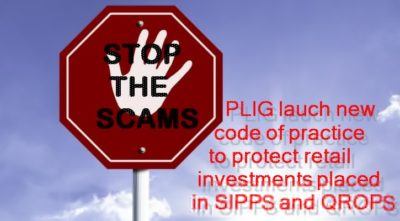

 There are many different types of pension scam – just as there are many types of genuine pension scheme. This can sometimes make it difficult to tell the difference so we are her to help you inform you about, what is a pension scam.
There are many different types of pension scam – just as there are many types of genuine pension scheme. This can sometimes make it difficult to tell the difference so we are her to help you inform you about, what is a pension scam.



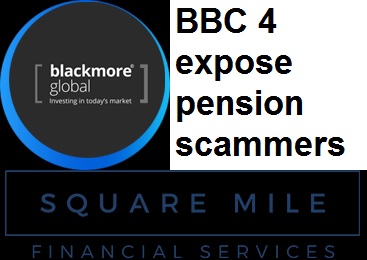


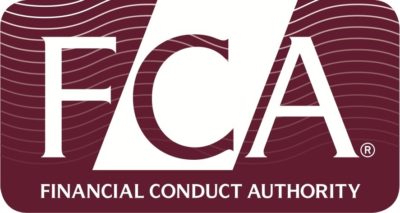
 Having succeeded in recouping a good chunk of his money, he received an email from Square Mile International Financial offering him a bribe of £6,000 to cease all contact with outside sources. This included regulatory authorities and Action Fraud!
Having succeeded in recouping a good chunk of his money, he received an email from Square Mile International Financial offering him a bribe of £6,000 to cease all contact with outside sources. This included regulatory authorities and Action Fraud!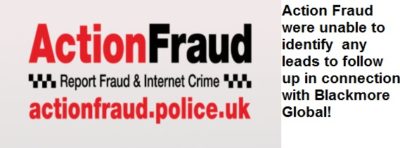 David Vilka insists that Square Mile International Financial is a completely legitimate firm. He claims the firm has been “inspected and verified in full by numerous regulators”. Furthermore, Stephen’s reports to Action Fraud were returned saying it had not identified any leads to follow up.
David Vilka insists that Square Mile International Financial is a completely legitimate firm. He claims the firm has been “inspected and verified in full by numerous regulators”. Furthermore, Stephen’s reports to Action Fraud were returned saying it had not identified any leads to follow up.



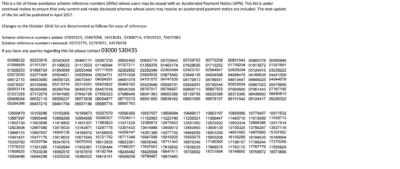 He could try checking the HMRC website – but all he would get is a bewildering list of numbers rather than the names or descriptions of the avoidance schemes themselves. Sometimes the accountant isn’t even using a named scheme but rather relying on his own experience and expertise to use a strategy he thinks/believes/considers/hopes will work for his client without risk of challenge by HMRC.
He could try checking the HMRC website – but all he would get is a bewildering list of numbers rather than the names or descriptions of the avoidance schemes themselves. Sometimes the accountant isn’t even using a named scheme but rather relying on his own experience and expertise to use a strategy he thinks/believes/considers/hopes will work for his client without risk of challenge by HMRC.




